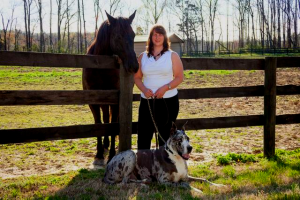
Kate Koehler is the Chemical Terrorism and Threats (CTAT) Coordinator, and Hemachemistry Unit Manager at the North Carolina State Laboratory of Public Health, where she has worked for 23 years. Kate graduated from North Carolina State University with a BS in Zoology and began working as a pathology technician at Experimental Pathology Labs in RTP. A few years later, she found her way to the Mycobacteriology lab and then the Environmental Chemistry lab at the North Carolina State Lab.
At this point, Kate decided to go back to school for a BA in Chemistry. Both her father and her grandfather were chemists and she admits she was much more interested in chemistry later in life. In 2002, she began working in the CTAT lab, and before rising to her current position, she was the supervisor of the Hemachemistry lab.
Kate’s main responsibilities as the CTAT Coordinator include: coordinating and supervising lab testing, implementing a comprehensive lab response plan, and managing the Public Health and Emergency Preparedness (PHEP) budget, which funds the CTAT lab program. Furthermore, she acts as a subject matter expert for ICP-MS (Inductively Coupled Plasma-Mass Spectrometry), one of the three testing platforms in the CTAT lab. Kate also coordinates with the Epidemiology section of the NC Division of Public Health for monitoring human exposures to chemicals. In her role as Hemachemistry Unit Manager, Kate coordinates lead testing for children and prenatal patients, and collaborates with the Children’s Environmental Health Branch, NC Healthy Homes, and a number of other organizations.
Kate joined the NC Lead and Healthy Homes Task Force to collaborate with people in the field to see what needs she could help meet in public health. At this point, she consistently heard from providers the need for testing prenatal patients, as recommended by CDC, but the State Lab was not doing prenatal testing at that time. As a result, she began a pilot program in February of 2016 to assess the feasibility of serving prenatal patients, and launched the program July 2016.
North Carolina is one of the few states to offer prenatal lead testing and this is especially exciting for Kate because enjoys the biomonitoring aspect of her job the most. As she looks to the future, she will be seeking more endeavors in biomonitoring; one possibility is collaborating with the Syringe Exchange Program to provide testing on the syringes collected in local communities as well as bio surveillance for first responders.
When she is not combating Chemical Terrorism and Threats in the lab, Kate breeds and trains horses at her horse farm in Chatham County and rescues cats. Currently, she has five horses, five chickens, nine cats, two donkeys, and one large Great Dane (pictured above).

